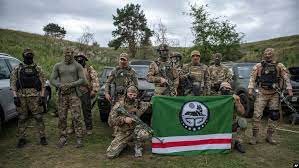In the wake of the devastating attack at a Moscow concert venue, claimed by the terrorist organization ISIS, Russia finds itself once again confronting the grim reality of terrorism on its soil.

Russia has been no stranger to terrorism, grappling with various threats from extremist groups for decades. However, recent developments, including the emergence of ISIS (Islamic State of Iraq and Syria), have added a new dimension to Russia’s counterterrorism efforts. This article aims to delve into the complexities of terrorism in Russia, with a specific focus on the role of ISIS and the factors contributing to the surge in terrorist activities.
Historical Context of Terrorism in Russia:

To understand the current terrorism landscape in Russia, it’s essential to examine its historical context. Russia has faced terrorism threats from various groups, including separatist movements in regions like Chechnya and Dagestan. The Chechen conflict, spanning several decades, has been marked by violence and insurgency, with groups like the Chechen separatists and Islamist militants carrying out attacks against Russian forces and civilians.
Emergence of ISIS and Its Impact on Russia:

The rise of ISIS in the Middle East has reverberated globally, including in Russia. While ISIS initially focused on establishing its caliphate in Iraq and Syria, its influence and ideology transcended borders, attracting recruits from different countries, including Russia. The influx of Russian-speaking fighters into ISIS ranks raised concerns about the potential for these individuals to return to Russia and carry out terrorist activities.
ISIS’s Propaganda and Recruitment Efforts in Russia:
ISIS’s sophisticated propaganda machinery played a significant role in attracting recruits from Russia. Through online channels and social media platforms, ISIS disseminated extremist ideologies, glorified violence, and promoted its vision of a global caliphate. Vulnerable individuals, including disillusioned youth and marginalized communities, were particularly susceptible to ISIS’s recruitment efforts, drawn by promises of belonging, purpose, and adventure.

Impact of ISIS-inspired Attacks in Russia:
While Russia has faced terrorism threats from various groups, ISIS-inspired attacks have added a new dimension to the security landscape. In recent years, Russia has witnessed several terrorist incidents linked to individuals influenced by ISIS ideology. These attacks targeted civilians and security personnel, striking fear and uncertainty among the population.
The Beslan School Siege:

One of the most infamous terrorist incidents in Russia’s history is the Beslan school siege, which occurred in 2004. Chechen separatists, including militants affiliated with Shamil Basayev, stormed a school in Beslan, North Ossetia, and held hundreds of hostages, including children. The siege ended in a tragic bloodbath, with hundreds killed and many more injured, leaving a lasting scar on Russia’s collective memory.

The Metrojet Flight 9268 Bombing:

In 2015, ISIS claimed responsibility for the bombing of Metrojet Flight 9268, a Russian passenger plane flying from Sharm El Sheikh, Egypt, to St. Petersburg, Russia. The bomb, planted onboard by ISIS-affiliated militants, resulted in the deaths of all 224 passengers and crew members. The incident highlighted the vulnerability of Russian aviation security and the global reach of ISIS terrorism.
The St. Petersburg Metro Bombing:

In 2017, a suicide bombing struck the St. Petersburg Metro, killing 15 people and injuring dozens more. The attacker, identified as Akbarzhon Jalilov, was reportedly inspired by ISIS ideology. The bombing underscored the persistent threat posed by lone-wolf attackers radicalized by ISIS propaganda, even within Russia’s borders.
Factors Contributing to Terrorism Threats in Russia:
Several factors contribute to the ongoing terrorism threats facing Russia.
- Socio-economic grievances and marginalization, particularly in regions affected by conflict and instability.
- Ethnic and religious tensions, exacerbated by historical grievances and socio-political dynamics.
- Geopolitical rivalries and external influences, including Russia’s involvement in conflicts abroad and its relations with neighboring countries.
- Weak governance, corruption, and inadequate law enforcement capabilities, creating fertile ground for extremist groups to operate.
- Transnational networks and foreign fighters, facilitated by porous borders and global connectivity, pose challenges to Russia’s security infrastructure.
Russia’s Counterterrorism Strategy:
In response to the evolving terrorism landscape, Russia has implemented a multifaceted counterterrorism strategy. This approach includes:

- Enhancing intelligence gathering and information sharing to identify and disrupt terrorist networks.
- Strengthening border security and cooperation with international partners to prevent the movement of foreign fighters.
- Implementing legal and legislative measures to combat extremism and radicalization, including anti-terrorism laws and surveillance mechanisms.
- Addressing root causes of terrorism, such as socio-economic disparities and grievances, through development programs and community outreach initiatives.
- Employing military force and targeted operations to neutralize terrorist threats, particularly in conflict-affected regions like the North Caucasus.
The surge in terrorism threats facing Russia, compounded by the emergence of ISIS, underscores the complex and multifaceted nature of the challenge. Addressing these threats requires a comprehensive approach that combines effective law enforcement, intelligence capabilities, socio-economic development, and international cooperation. By understanding the factors driving terrorism and adapting its counterterrorism strategy accordingly, Russia can mitigate the risks posed by extremist groups and safeguard its citizens’ security and well-being.